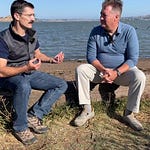Large language models (LLMs) seem to dominate the discussions, at least in my world lately. In this episode and the next, we’re diving into AI on a different scale. In this episode, I spoke with Josh Hinckley, co-founder and CEO of Bioqore. AI is being applied to the way we make things — in this case, food. Josh’s background in materials chemistry has led him to focus on process optimization for alternative proteins, where the challenges in the market are high: you have to make large quantities efficiently, the price point has to be realistic for consumers and on top of all that, the end product has to meet all your sensory requirements. A fancy way of saying it has to smell, taste and feel right.
When you're making pharmaceuticals, small yields are fine because the value per milligram gram is high. But for food, you need much larger quantities. People aren’t going to pay $100 for a gallon of milk. So alternative food companies are under pressure to optimize production at a scale biotech typically doesn't deal with.
The example he gave was alternative milk. It’s real milk, but produced without cows. It looks, tastes, and behaves exactly like traditional milk but doesn’t require pasteurization. But moving from liquid milk to structured products like meat is a much bigger challenge, because the texture and mouthfeel matter just as much as the composition. Food isn’t just chemistry, there is an emotional component to eating (memories, adventure…).
That’s where Bioqore’s AI platform, Voyager, comes in. In contrast to traditional design of experiments (DOE) methods that can be rigid, and sometimes inefficient, Voyager uses active learning, a machine learning approach that continuously refines its model based on outcomes. Instead of running 20 experiments at every stage, you might only need five targeted ones to find your optimal process. It's smarter, faster, and cheaper.
Not subscribed? Let’s fix that. No spam, just good content wherever I find it.
Josh broke down Voyager’s process into three stages: sampling, exploration, and exploitation. First, it samples combinations of variables broadly to get a feel for the landscape. Then it explores areas where the outputs look most promising more deeply. Finally, once the model understands the system, it exploits that knowledge to hone in on the ideal process.
What stood out to me was how machine learning is enabling discoveries humans would likely dismiss. Biology often behaves in unpredictable ways. Human beings are biased by our own limited experience and expectations or mental models of how things should work. Machines don’t suffer from those attachments. They can explore n-dimensional spaces we can’t even visualize and show us possibilities we wouldn’t have believed without the data in front of us. AI is allowing us to see things where we never would have looked.
Josh and his team are close to a major leap forward: they’re finalizing investment rounds to support not only their food optimization platform but also rapid therapeutic development, including more efficient insulin production. In just six weeks since we first spoke, Bioqore’s trajectory has accelerated dramatically.
Your deepest insights are your best branding. I’d love to help you share them. Chat with me about custom content for your life science brand. Or visit my website.












